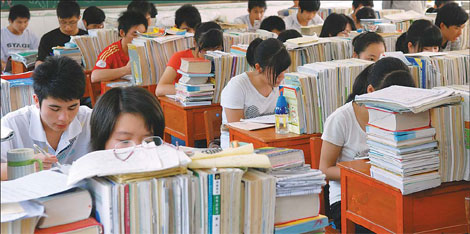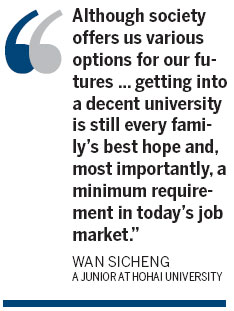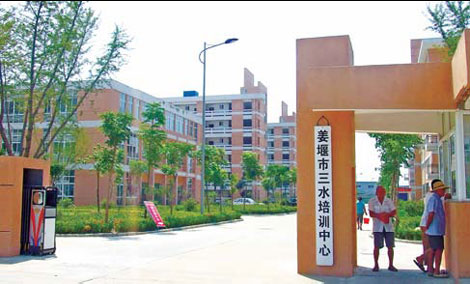Life and Leisure
Test of perseverance
By Zhang Yue (China Daily)
Updated: 2010-08-31 14:35
 |
Large Medium Small |
|
 High school students preparing for the university entrance exam, or gaokao. Some will have to put up with one more year's effort to get higher scores. Yu Xiangquan / For China Daily |
Students with low university entrance exam scores are flocking to Jiangsu province's Jiangyan for intensive training, betting on brighter job prospects with one more year's toil. Zhang Yue reports
Wan Sicheng endured the pressure of his yearlong preparation for the university entrance exam, or gaokao, in the expectation he could relax afterward.
His test scores, however, for the exam he took in Jiangsu's provincial capital of Nanjing four years ago only qualified him to enroll in a third-tier college.
"For a while, I just didn't know what to do."
A week later, he found an answer. Wan joined hundreds of high school graduates heading to Jiangyan, 200 km from Nanjing, capital of Jiangsu province, that has become an intensive training center to retake the gaokao.
"Almost everyone in Jiangsu agrees that Jiangyan is the best place to train for retaking the exam," he says.
"Although society offers us various options for our futures getting into a decent university is still every family's best hope and, most importantly, a minimum requirement in today's job market."
One year after beginning his training in Jiangyan, Wan retook the gaokao in 2007, this time scoring 633 points - 104 more than in his first round.
|
The Sanshui training school in Jiangyan is regarded as the best of the four centers in the city training students to retake the gaokao. Zhang Yue / China Daily |
Today, he is a junior at Nanjing's Hohai University, one of the country's top-level schools.
Wan says he firmly believes his experience at Jiangyan transformed his life.
"I think what we learned from that year of study is how to handle the immense pressure we all faced and how to discipline ourselves. It will remain a milestone in my life, whatever my future holds," he says.
The city has been acclaimed for its academic excellence since the 1980s. In that decade it became one of the province's first cities to promote educational reform. Reform took place in most of other provinces in the 1990s and looked to Jiangyan for guidance.
Jiangyan High School has produced the province's highest gaokao scorers for the last decade, and the university enrollment rates at Jiangyan high school graduates has been in the public spotlight. Most of the teachers for the gaokao retake programs are retirees from local high schools.
A student from a Jiangyan training center earned the highest marks among those who retook the university entrance exam in the province in 2006.
Every year since, low scorers - and their parents - have continued pouring into the city. Some parents even quit their jobs to stay in Jiangyan to care for their children.
The most common mode of transport in the city isn't bus or taxi, but tricycle, costing no more than 5 yuan ($74 cents) to get anywhere within the city limits.

Wang Cheng, who has worked as a tricycle rider for more than a decade, says he takes about six passengers to gaokao retake training schools every day in July and August. Most are from other cities in Jiangsu and are accompanied by their parents.
Wang says he believes the reason tricycles are so popular in the city is the residents are "lazy". But students preparing for gaokao retakes don't know the meaning of the word.
Unlike in the bustling metropolises, the city is hardly awake before 9 am, and after 9 pm, there's hardly a pedestrian downtown, where the only local "landmarks" are a large supermarket and a McDonald's.
Students at Yucai training school, one of four such centers in the city, start with reading class at 6:30 am, Monday through Saturday. After eight more courses, they attend study hall from 6:45 pm until 10:30 pm. The dorm lights go out at 11 pm, to make sure students don't stay up past then.
Students get a three-hour break on Sunday afternoon, during which time they can go downtown or nap.
Nanjing native Yang Kai has been training at Yucai for about two months. The 18-year-old arrived at the center after learning he had failed this year's university entrance exam.
"Sometimes, I feel dizzy operating on only six hours of sleep and studying so intensively every day," Yang says.
"When I feel sleepy in class, I stand up for a moment. We think it's quite a useful way to stay clearheaded."
Chemistry instructor Qian Yong, who has worked at Yucai for eight years, says preparing to retake the gaokao is both an "academic and mental challenge".
"Students usually come to us in high spirits, but the most difficult thing is to keep up their spirits while facing such intense pressure and the possibility they might fail again due to unforeseeable circumstances," Qian says.
Even so, the students persist.
Sanshui training school, regarded as the leader of the four centers for retake students, says about 1,400 students have signed up since July.
It has divided the enrollees into 20 classes of about 70 students each - as opposed to ordinary high schools, in which about 2,000 students are divided among three grades.
After its relocation from near the intercity bus station last year, the school reopened in a southern suburb, surrounded by factories and villages.
While most students live at the school, some do home stays with villager-families, which spares them from having to rush to use the restroom before 6 am.
Qian Zhongyu and his wife decided last year to host some Sanshui students, as their two-story house had four empty rooms.
"The three girls living with us were under extreme pressure," Qian says.
"They worked until very late every night. My wife and I make them dumplings on weekends, so they feel at home. It's not easy to be away from their families and face such crushing stress."
All three of the girls were admitted to universities this year, Qian says.
The rooms in Qian's house cost students about 6,000 yuan ($803) a year. Although classes don't begin until Sept 1, incoming students have already booked three rooms.
Many parents are also renting rooms in nearby villages.
Yu Chengfang rented a room for 4,000 yuan a year when she brought her 19-year-old son Zhang Di to Sanshui in mid-August. Yu and Zhang live in Dafeng, about an hour and a half from Jiangyan by bus.
She was astonished to discover she had to pay 12,500 yuan - about half of the family's 30,000-yuan annual income - for Zhang's admission. Fees are based on student's gaokao scores, with those who score lower marks paying more for the training.
Her son made 286 points on this year's exam - 40 points lower than the university admission cutoff in Jiangsu.
The 42-year-old mother is a farmer, and her husband works in Dafeng's freight industry.
"There's no thinking about the cost, because we're paying for our boy's schooling," Yu says.
"It's very important for his future that he gets into university."
Zhang's low scores still qualify him for enrollment in a junior college.
"But it's so hard to find a decent job even with a university degree, let alone a junior college diploma," Zhang says.
"If I get into a good university with a good reputation, it will help me with future job hunting."
While many students, such as Zhang, are busy preparing for their second attempts at university admission, Wan, who is about to graduate from Hohai with a bachelor's degree in hydrology and water resource science, is busy working on his post-graduate enrollment application.
"Even after graduating from university, I'm finding that it's hard to get a good job in Nanjing," Wan says.
"I believe the competition won't be so fierce for me if I have a master's."
Wan says there are times he wonders if retraining to take the gaokao was worth it, because he still needs to apply for his post-graduate program.
"Finding a good job is even trickier than getting into a good university," he says.
